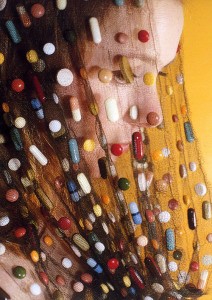The Birth of Medico-Political Art
Joe Collier

There can hardly be anything more stimulating than the birth of a new art form, but here we have it. Moreover, how fitting it is that the works are displayed at an exhibition at Contemporary Applied Arts. If the powerful pieces displayed in Pharmacopoeia are not contemporary and applied, what are they?
Art and medicine have long been related. Florentine artists in the fourteenth century were so fascinated by the human body that they became dissectors of bodies at the University. Leonardo Da Vinci almost certainly dissected the bodies he portrayed in his series showing detailed human anatomy (inside and out) a hundred years later. But leaving aside dissection (and the tradition still continues with the recent controversial work of Anthony Noel Kelly), artists have depicted disease as in the famous gouty knee by Raphael in the early 1500s and the pictures of madness by Goya. Applied art too is part of medicine, as art and design are used both to sell medicines in promotional material, and in their product design – surely an artist had a hand in Viagra’s diamond shaped blueness.
The politicisation of medicines is also not new. The concept of political prescribing certainly surfaced in London in the late 1980s. Gradually it was realised that women were being given sleeping pills and sedatives, not because they were ill, but because it offered doctors (and society in general) an easy way of dealing with poverty, noisy neighbours, damp walls and domestic violence.
Pharmacopoeia takes on a new dimension. Here, with beauty, skill an insight, are explicit contemporary commentaries about our relationship with medicines and with treatments generally. The works bring home the enormity of our reliance on drugs, coupled with the power of mechanical help as provided by interuterine contraceptive devices and prostheses such as hip replacements. It also illustrates how wasteful our relationship can be as medicines are unused or abused. With this exhibition, Medico-Political Art is born.
Congratulations to the parents, Susie Freeman and Liz Lee, and to the Wellcome Trust, who through their Sci~Art award revealed their skills in midwifery.